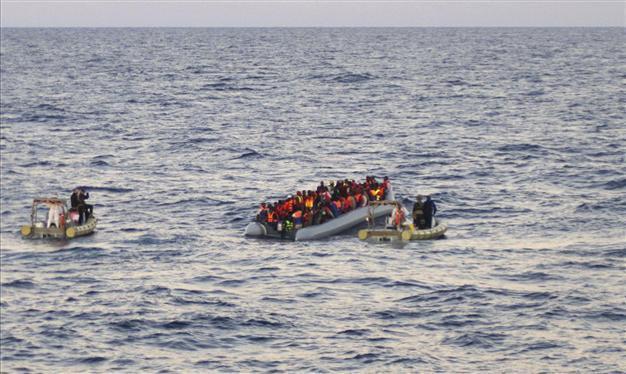UN rights chief slams indifference over migrant deaths at sea
GENEVA - Agence France-Presse

In this photo taken Dec. 4, 2014 provided by the Italian Navy, rescue crews approach migrants on a rubber boat some 65 kilometers from the Libyan capital, Tripoli. AP Photo
The U.N.'s human rights chief on Dec. 10 condemned rich nations for their indifference to waves of global migration, after new figures showed more than 3,400 people died in the Mediterranean this year trying to reach Europe."The lack of concern that we see in many countries for the suffering and exploitation of such desperate people is deeply shocking," U.N. High Commissioner Zeid Ra'ad Al Hussein said at the start of talks on the issue in Geneva.
He added: "Rich countries must not become gated communities, their people averting their eyes from the bloodstains in the driveway."
A record 348,000 migrants and refugees took to leaky boats this year in search of a better life in Europe, South-East Asia, the Caribbean and the Middle East, 4,272 of them dying in the process, according to the U.N. refugee agency.
Most of these were in the Mediterranean, where more than 207,000 made the crossing since January, almost three times the previous high of 70,000 during the Libyan civil war in 2011. A record 3,419 lost their lives.
For the first time in several decades, almost half of those hoping to make it to Europe are refugees rather than economic migrants, including 60,051 Syrians fleeing their country's war and 34,561 Eritreans fleeing the regime.
Others are being driven by lack of jobs, natural disasters and food and water shortages, and a growing number of women, children and elderly people are on board.
"If entire families are risking their lives at sea today, it's because they have already lost everything else and see no other option to find safety," said the U.N.'s High Commissioner for Refugees Antonio Guterres.
"And as they get on these boats, more and more of them drown on the way, some within sight of land." Guterres is hosting a two-day meeting involving governments, NGOs and representatives of naval and shipping groups in a bid to find ways to stop so many people risking their lives on smuggling boats.
He warned that cracking down on traffickers was not enough - efforts must also increase to address the reasons why people are fleeing their homes, and to give them legal, safe ways of seeking a new life elsewhere.
An arc of conflict around Europe's southern, eastern and southeastern borders, in Libya, Ukraine, Syria and Iraq, is one reason so many people are heading to the continent.
At the same time anti-immigration rhetoric is growing across the EU, fuelled by economic concerns following the financial crisis, and prompting calls for tougher border controls.
"At a time when an unprecedented number of people are forced to flee conflict and persecution across the world, barring them from accessing protection further afield is the opposite of what is needed," Guterres warned.
He said: "Any effective response must also address the root causes of this phenomenon." Most of those crossing the Mediterranean head to Italy first, and the country has rescued more than 150,000 people so far this year.
But it recently ended its Mare Nostrum search-and-rescue operation after its European Union partners refused to help fund it, with critics arguing that saving the migrants was simply encouraging them to try their luck.
Guterres praised the operation and warned that maintaining an effective European search and rescue after the Italians step back "will be essential" to save lives.
While the Mediterranean is the most deadly route, it is by no means the only one.
At least 242 people died in the Red Sea and Gulf of Aden out of 82,680 people making the journey, most of them travelling from Ethiopia and Somalia to Yemen or onwards to Saudi Arabia or the Gulf states, the UNHCR said.
About 540 people also died this year crossing the Bay of Bengal, out of a total of 54,000 making the journey, while another 71 deaths out of 4,775 crossings were reported in the Caribbean, the UNHCR said.
















